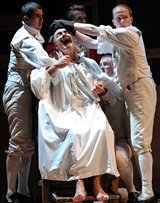SITE GUIDE
SEARCH
REVIEWS
REVIEW ARCHIVES
ADVERTISING AT CURTAINUP
FEATURES
NEWS
Etcetera and
Short Term Listings
LISTINGS
Broadway
Off-Broadway
NYC Restaurants
BOOKS and CDs
OTHER PLACES
Berkshires
London
California
New Jersey
DC
Connecticut
Philadelphia
Elsewhere
QUOTES
TKTS
PLAYWRIGHTS' ALBUMS
LETTERS TO EDITOR
FILM
LINKS
MISCELLANEOUS
Free Updates
Masthead
Writing for Us
A CurtainUp  London Review
London Review
 London Review
London ReviewThe Madness of George III
|
The state of monarchy and the state of lunacy share a frontier.
— Dr Willis
|

David Haig as King George and footmen (Photo: Robert Day) |
Bennett’s play is essentially a comedy, an affectionate portrait of the king also known as Farmer George because of his interest in husbandry although he also made a close study of science and astronomy. The terrible pain of the king’s illness is compounded by the efforts of the 18th century physicians, whose “cures” relied on methods such as purging, bleeding with leeches or cupping, the placing of hot glass jars on the skin, which in the play is called blistering because that is the effect on the skin. The doctors compete with professional rivalry, jealous of their membership of the College of Physicians. The “happy ending” of the play, the cure for the king from Dr Francis Willis (Clive Francis) was not longstanding and the political need was for the Regency to be created with the Prince Regent (Christopher Keegan), later George IV, taking over the rule from his incapacitated father.
Although it has a large cast, the majesty of Luscombe’s production is created with some uplifting choral music from Handel and the assembly of the bewigged and costumed court with the footmen in their distinctive red and gold livery. Queen Charlotte (Beatie Edney), that most prolific of bearers of royal children (15 of whom 13 survived to adulthood) is also there, heavily accented as Charlotte of Mecklenburg would have been, but denied her husband’s company as he behaves violently and raves sexually about one of the Mistresses of the Royal Bedchamber, Lady Pembroke (Charlotte Asprey). Janet Bird’s set is suggestive rather than sumptuous, a screen of empty gilded frames that would have displayed royal portraits.
The scenes where the king is subjected to the doctors’ cures are distressing. Even with Dr Willis who uses a kind of behaviourist aversion therapy with some success, the king is reduced to a man strapped in a chair or secured by a straitjacket. While the king is affected by illness, the politicians of Charles James Fox (Gary Oliver) and the Whigs back the Prince of Wales in an attempted coup against Pitt the Younger (Nicholas Rowe) and George III. As he recovers, George III movingly plays the madness scene from King Lear as Shakespeare is used as therapy although apparently no-one had any idea that Lear is about the descent of a king into mania.
This production relies on the magnificent performance of David Haig as he softly conveys a friendly monarch with terrible delusion. There are scenes when he is manic and hyper, seemingly chuntering on for hours without pausing for breath, others where he is in obvious pain. Christopher Keegan as the Prince of Wales is lampooned for his obsession with style and fashion and Alan Bennett’s inimitable sense of humour, of us at our most ridiculous, is laced into the script. I particularly enjoyed the footman who leaves employment at the court to start a provisions merchant in Piccadilly. Fortnum is his name!
The Madness of King George requires a huge cast and so is rarely performed, many relying on the 1994 film version to see it. Don’t miss David Haig’s splendid rendition of the deranged king live on stage!
|
Subscribe to our FREE email updates with a note from editor Elyse Sommer about additions to the website -- with main page hot links to the latest features posted at our numerous locations. To subscribe,
E-mail: esommer@curtainup.comesommer@curtainup.com
put SUBSCRIBE CURTAINUP EMAIL UPDATE in the subject line and your full name and email address in the body of the message -- if you can spare a minute, tell us how you came to CurtainUp and from what part of the country. |
| The Madness of George III
Written by Alan Bennett Directed by Christopher Luscombe Starring: David Haig, Nicholas Rowe, Beatie Edney, Clive Francis, Christopher Keegan, Thomas Wheatley With: William Bedchambers, Charlotte Asprey, Ed Cooper Clarke, Orlando James, Beruce Khan, Ryan Saunders, Peter McGovern, Simon Markey, Gary Mackay, Richard Hansell, Gary Oliver, Patrick Moy, Peter Pacey, Madhav Sharma, John Webb, Karren Winchester, Chris Calphy, Haseeb Malik Designed by Janet Bird Lighting: Oliver Fenwick Composer: Malcolm McKee Sound: Mic Pool Movement: Jane Gibson Running time: Two hours 25 minutes with an interval Box Office: 0844 412 4658 Booking to 31st March 2012 Reviewed by Lizzie Loveridge based on 23rd January 2012 performance at The Apollo, Shaftesbury Avenue, London W1V 7HD (Tube: Piccadilly Circus) |
|
REVIEW FEEDBACK Highlight one of the responses below and click "copy" or"CTRL+C"
Paste the highlighted text into the subject line (CTRL+ V): Feel free to add detailed comments in the body of the email . . . also the names and emails of any friends to whom you'd like us to forward a copy of this review. |




